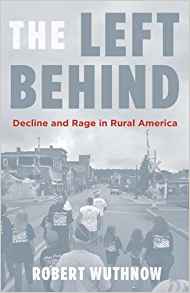 Robert Wuthnow, The Left Behind: Decline and Rage in Rural America (Princeton: Princeton University Press, 2018), 192pp.
Robert Wuthnow, The Left Behind: Decline and Rage in Rural America (Princeton: Princeton University Press, 2018), 192pp.
Robert Wuthnow is the first to admit that he's part of what he calls "the liberal elite." He's a sociologist at Princeton University, he lives in a wealthy community, he's a progressive on social issues like abortion and gay rights, and he opposed "most everything" about the Reagan and Bush administrations. "This is my world," he writes, and "it feels right." And yet as a sociologist it is precisely his scientific responsibility to understand communities that are different from his own on their own terms, and to appreciate how such people feel that their own values are as "equally right" as his. That's what he does in this book: "I've attempted to understand them as fairly and objectively as I can."
Wuthnow has at least some autobiographical advantage. He's a native of Kansas, where he went to grade school in a town of six hundred people. That school has been empty for decades. He attended high school in a town of five thousand, which today is only half that size. These are his people, and "they gave Trump 74 percent of their votes." In fact, data shows that the smaller a county, the more likely it was to have voted for Trump.
In addition to his personal story, this book is based upon over a thousand interviews with some of the thirty million Americans who live in towns with populations of 25,000 or less. So, with the sociological data that you would expect from Wuthnow, this book also contains many dozens of first person anecdotes based upon his interviews, like stopping for gas in the middle of nowhere and talking to the attendant.
The most important methodological feature of Wuthnow's book is that he insists that we must understand people not just as independent individuals but as parts of a larger moral community. That is, people have a distinct sense of place to which they feel obligations, have expectations, and ideas about what they understand as an ordinary and good life. When you understand the characteristics of these distinctly rural communities that Wuthnow has in view, it becomes very understandable why people in these towns express fear and even rage.
Wuthnow doesn't romanticize rural Americans, but he does respect them. These communities face numerous challenges that endanger their very existence. Population decline. Lower education standards that exacerbate brain drain. Teenage pregnancy. Drug epidemics. An increasingly global economy. Fewer jobs. Immigration that impacts their white homogeneity. And cultural issues like abortion and gay rights. Walmart, Amazon and the internet have devastated their Main Street small businesses. Making it all worse, for people in these communities, the federal government both ignores and intrudes upon their lives. Washington, in their experience, doesn't listen to them, doesn't care, doesn't understand them, and condescends.
No wonder rural Americans channel their anger through Rush Limbaugh and Donald Trump. "My message for fellow academics and 'producers of knowledge' in the liberal elite," Wuthnow writes in his epilogue, "is that rural America is not crazy."


